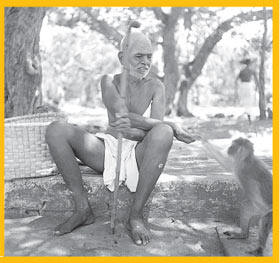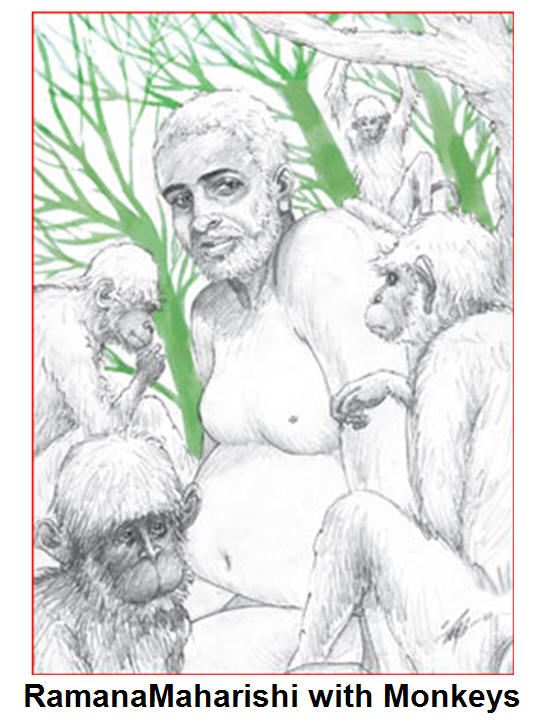Sakthi Vikatan - 26 Jul, 2011 Revised 2018 June 23

If you pay attention properly, you can understand all languages
including those of animals. Animals talk directly with no circumlocution
whether it is anger, sexual impulse, foreplay…The have no fear.
It is usual for Srīramaṇar to sit in Virūpākṣi cave and watch the
monkeys make screeching noises, engage in fights… The monkeys move in
troops. The troops fight with each other. They explore various
strategies. The troop sends an envoy monkey to the other troop. If the
envoy is chased, there will be a fight. When they tire of fighting, they
come for arbitration to Srīramaṇar.
Bhagavan brings them to a reconciliation. He points out who is wrong and
who is right. The monkeys accept his verdict with silence. This usually
bring the fight to an end. The king-monkey attacked a youth-money and
bit it hard. The injured monkey was laying in the entrance to the cave.
Srīramaṇar applied medications, massaged the back and brought it back to
health. Because of injury, one of its legs is lame. Bhagavan named it
‘Lame Boy.’ When other monkeys stayed at the entrance, while the
handicapped monkey usually entered the Virūpākṣi cave and sat before
Bhagavan to eat. The other monkeys watch it with amazement. Lame Boy
being a sloppy eater, usually spilled the food around. Bhagavan sternly
told the monkey, “You must not scatter the food.” It ate the spilled
food first and later ate the food on the plate. It climbed on the lap of
Bhagavan and played with him. It circumambulated around him. It used to
climb on the back of Bhagavan and earned respect from other monkeys.
Whatever the case is, monkey is a monkey. Once the lame monkey tossed
the plate causing scattering of the food.
Bhagavan scolded the monkey, “Why are you wasting the food?” The monkey
slapped Bhagavan on the face. Bhagavan stared at the monkey, which left
his presence promptly in fear. Bhagavan told the monkey not to come
inside the cave, it blinked the eyes, paced left to the right, stood at
the entrance and begged (for forgiveness), It touched Bhagavan’s foot
and moved. Bhagavan turned his face away. It moved towards the turned
face and begged. As bhagavān rebuked, he moved outside and sat.
For three days, Bhagavan did not speak to it. He did not even turn his
head towards the slapping monkey. The monkey was upset.
On the 4th day, Bhagavan forgave him. The monkey ran
and sat on his lap. It put its arm around his neck and begged for
forgiveness. It climbed on his chest and back and played. But the lame
monkey made another mistake. Hot milk was poured on the plate. It was
waiting expectantly to drink it.
Immediately it was restless to drink the milk. Fearing that hot milk
will scald his mouth, Bhagavan pulled the plate away from the monkey and
blew air on the milk to cool it. Thinking Bhagavan will drink, the lame
monkey slapped on the cheek.
It was not a hard slap. Bhagavan gave the milk to the monkey. It
begged for forgiveness. Bhagavan forgave the monkey. Because of
proximity to Bhagavan, the lame monkey earned respect with other monkeys
and became the head of the troop.
In the summer, when Bhagavan and his devotees went on circumambulation
of the mountain, they all were very thirsty. There were no well or lake
nearby. A troop of monkeys came and shook the black plums off the trees.
The monkeys did not eat the fruits but Bhagavan and the people ate the
fruits and quenched their thirst.
How did the monkeys know about the thirst? Wherefrom did they come?
Why did they not eat one fruit? When you show love, are there any
who do not return that love? If we render help to someone at an
opportune time, would needed help not arrive our way when we need it?
This what Mahāns teach us. Bhagavan teaches us to love and help others.

They showed inordinate love for Bhagavan. The movement of his eyes and
fingers, and speech brought them under his control. They never made a
mess with their scat as other animals of the same species did. Bhagavan
spoke high of a dog named Ciṉṉa
Karuppaṉ
(‘Little Black [Dog].’) This dog used to pace up and down near the
entrance to the cave.
Ciṉṉakaruppaṉ used to stay behind a bush and kept a watch on Āśramam.
Whenever someone offered him food, he waited until the person left to
eat the food. If anyone walked near the Āśramam, he stopped eating and
resumed the role of a watchdog. He
developed no friendship with the residents of the Āśramam. He was close
and yet not close to them. This behavior of studied aloofness of the dog
was surprising. One day Ciṉṉakaruppaṉ stepped before Bhagavan raised his
forelegs, acted endearingly and circumambulated him. When Ciṉṉakaruppaṉ
met Bhagavan, it showered its love on him.
Later, he circumambulated the inmates of the Āśramam and behaved
endearingly.
An orthodox Brahmin when performing Japam saw the dog coming towards
him, yelled at it and shooed it away from his presence. Another inmate
of Āśramam threw a stick on it. It yelped and ran. It never came back
again for a few days. It came later.
It is surprising to see such sensitivity and pride in a dog. The
other dogs were all sensitive. A devotee scolded a small dog prompting
the dog to jump in a pond. A little while later, the dead body was seen
floating.
Likewise, a monkey also committed suicide. Sikappan and Kamala like
Ciṉṉakaruppaṉ are the other two dogs wont to circumambulation. Once
Bhagavan commanded Kamala to take a devotee around the path of
circumambulation around the mountain. Kamala complied with the order.
These animals performed essential service to Bhagavan. Not only
the domesticated animals but also the wild animals languished for
Bhagavan’s side-glances.
Two panthers were roughhousing nearby. Seeing them, Vasudeva Sastrigal
suggested to Bhagavan to move inside fearing an attack by them. Bhagavan
refused to go inside. Only when we shout, “Ayyo (OMG) tiger,” they will
in fear think, “Ayyo (OMG). Man.” If we do our work, they will go their
way. Ayyo = OMG
Half is fear as the cause of fight. Absence of fear is seen only in
Jñānis. Jñānis have the exemplary behavior of showing love to animals,
birds and people.
Bhagavan Ramanar had this universal love in unlimited fashion. The fauna
around Bhagavan enjoyed his love. Wherever there is love, that place is
eternal and becomes a temple.
Let us get Darśan.

